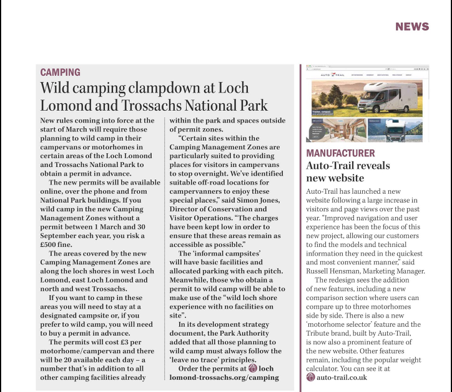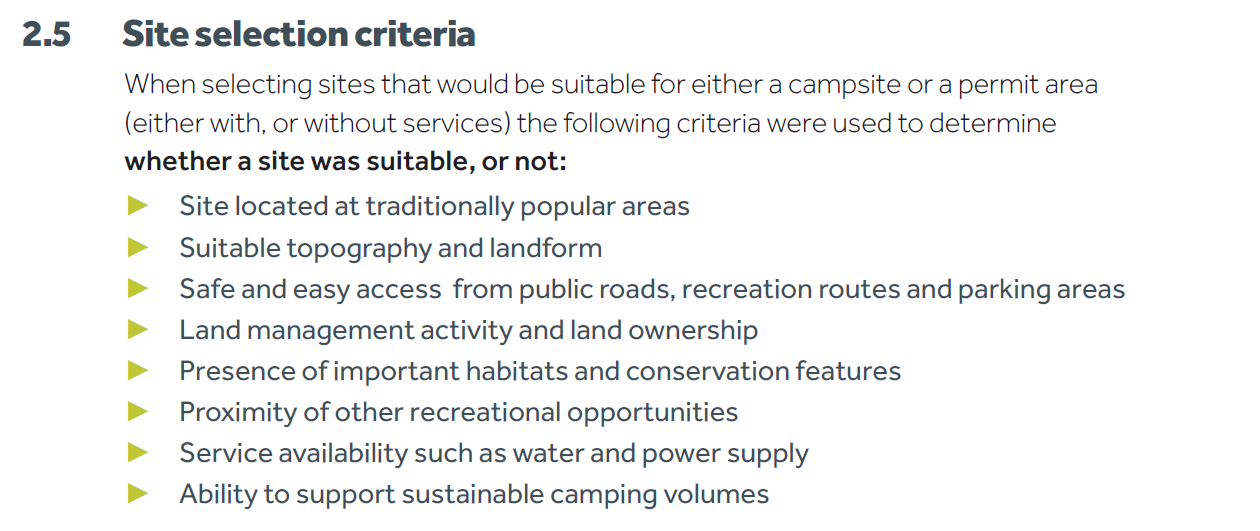
Even by the standards of the Loch Lomond and Trossachs National Park Authority, the article which they appear to have placed in the March edition of the Motorhome magazine reaches new lows. I hope that every campervaner or motorhomer who reads the magazine complains to the National Park.
The statement that campervaners/motorhomers require to apply for a permit in advance is a double lie. First, because staying in a vehicle overnight on roads is exempt from the camping byelaws.

And public road is defined as follows:

What’s more, legally the definition of a road includes the verge. This was clearly stated in the definition of road in the first version of the byelaws but since been removed (possibly because it did not suit the National Park to draw anyone’s attention to this).

What this means is that anyone can stay overnight in a vehicle on any road, layby or carpark run by a roads authority unless the roads authority has explicitly prohibited this under Road Traffic Legislation. Since at present there are very few places in the Management Zones where the Roads Authority has prohibited vehicles stopping off or staying overnight, campervans will still be able to stop off almost anywhere in the camping management zones as long as they are prepared to stay on the road network. The statement in the article that a permit is required to stop overnight is therefore a lie.
The second part of the statement, that if you want a permit you need to book in advance, is also a lie unless the Park has secretly has changed its plans. The public position of the LLTNPA at the last Board Meeting was that campers and campervanners who turned up in permit areas should be able to book a permit through their phone, i.e not in advance. That’s why the lack of phone coverage in some of the management zones is of such concern to the LLNPA.
The further statement in the article that “if you want to camp in these areas (the camping management zones) you will need to stay at a designated campsite or, if you prefer to wild camp, you will need to buy a permit in advance” repeats the lie and misinformation. I don’t blame the Motorhome Magazine at all for this. They will have been fed the information by the LLTNPA and accepted it in good faith. The lesson for all recreational organisations and journalists is not to trust a word the LLTNPA says without checking it independently first.
So why has this mess happened?
There is clear evidence that the LLTNPA has always intended to ban campervans and motorhomes just like campers. Indeed if anything its taken a harder line against campervans and motorhomes. This is illustrated by it allowing only 20 permit places for campervans across all four management zones and its failure to provide a single campervan place at the new campsite at Loch Chon despite the doubling in size of the parking area there (see here).
The obstacle the LLTNPA has faced in its wish to ban campervans is road safety and the provisions of the Road Traffic Act, many of which are about freedoms to travel. It was because of this that roads and laybys were exempted from the byelaws.

The application of the byelaws to campervans and motorhomes
The LLTNPA does not appear to have thought through the implications of this exemption on its attempt to ban campevans. Instead, their focus at present is on trying to persuade Transport Scotland to ban overnight stays in its laybys. However, even if they succeed (and I believe there needs to be full public consultation on this), unless all the roads in the management zones are turned into clearways, there will still be hundreds of places that are classified as being part of the roads network and where you can still lawfully sleep in a vehicle overnight.
Parkswatch has previously commented on the implications of the roads exemption for enforcement of the byelaws and how, without clear signage, they could displace campervans into villages(see here). Building on that analysis, there is an important difference in how the byelaws apply to campers and campervaners:
- The offence for campers is to put up a tent, wigwam or bivouac at any time, or to occupy any form of shelter overnight – not to go to sleep as such. Indeed, under the byelaws you can still sleep in the open overnight.
- The offence for people with vehicles who take their vehicle off the road network is to sleep in the vehicle overnight.
Its important to note here that under road traffic legislation no offence is caused by parking your vehicle up to 15m off the road network and overnight for both campers and campvaners is defined as anytime between 7am and 7pm.
The legal position as outlined will I believe make it impossible for the LLTNPA to enforce the byelaws with respect to campervans. Fancy stopping off along the A82 as you used to do on the way north? Well, if your favourite stopping off place is beyond the road verge, for example one of those tracks down to lochside, you have every right to stop off there in your vehicle, even overnight, so long as you don’t go to sleep. If while sitting in your vehicle, Rangers come and tell you its an offence to stay in the place overnight, if you acknowledge that and say that you ntend to park the vehicle on the verge before going to sleep there is NOTHING the rangers. And unless the Park starts to deploy Rangers overnight (which would cost a fortune) if you do fall asleep without moving your vehicle onto the verge the likelihood of being caught is minimal.
Now, imagine the scenario where the Rangers visit early in the morning and find a vehicle parked off road with the curtains drawn. How will the Rangers be able to prove whether someone was asleep or not? All the occupants of the vehicle need to say is they were not asleep, they had moved the vehicle to its current position when they had woken up and had drawn the curtains for privacy reasons. It would be very very hard for the Park to prove anything in a Court of law. In fact this is all very reminiscent of some of the LLTNPA’s concerns about alcohol byelaws: they claimed such byelaws did not work because the offence was to drink in the outdoors and drinkers when approached could avoid being charged by retreating with their tipple into their tent. If that’s difficult to prove (and I am not so sure what the LLTNPA claimed is true), how much harder will it be to prove anyone was sleeping in a campervan in a camping zone?
Instead of being open and honest about the legal position – and informing its own staff who are supposed to enforce this – the LLTNPA appears to be hoping to cover-up their own incompetence and legal shambles by trying to con the public into believing they can only stop off in a vehicle in a management zone with a permit. Hence the placed article in Motorhome magazine. Hence the lie. The only way that the Park is going to be able to stop campervans stopping off overnight is not through byelaws, but by blocking off all exits from roads and parking areas. The LLTNPA has been busy trying to do this by installing gates to all its car parks, which has huge implications for people’s ability to enjoy the countryside, but it has a long way to go before it can control all access in the National Park.
More parkspeak
As an addendum to this, the LLTNPA claims in the article that the 20 campervan places provided through the permit system are “particularly well suited to providing places for visitors in campervans to stop overnight”. The Park’s “criteria” for how it selected permit sites, included nothing specific on campervans:

Every campervaner who enjoys being able to stop off and enjoy the countryside should ask the LLTNPA what criteria they have used to decide whether a place is “particularly well suited” for campervans. There is none. The people who know best where to stop are the people who use campervans, not the National Park Authority and because of the way the byelaws are worded, they can still stop off in most of their favourite places by the lochshores as long as they ensure their vehicle is on part of the roads network when they go to sleep.
The loch lomand trust don’t own the forestry commission I was under the impression it was the tax payer so who is pulling the forestry chain